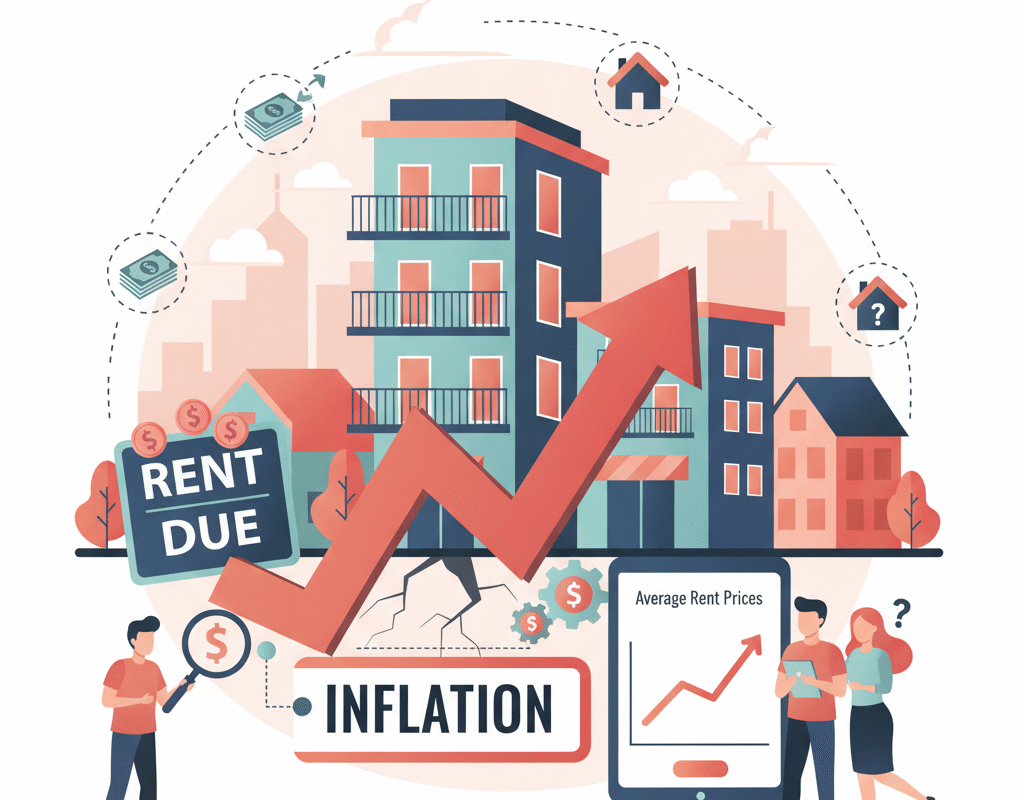How Inflation Impacts the Rental Market?
How Inflation Impacts the Rental Market?
Inflation is a term that has been dominating headlines in recent years, and its impact extends far beyond grocery bills and gas prices. Among the sectors most visibly affected is the rental market.
For renters, landlords, and real estate investors, inflation brings both challenges and opportunities, altering the dynamics of supply, demand, and affordability.
Understanding the interplay between inflation and the rental market is essential for navigating the evolving housing landscape in the United States.
HSBC Cashback Credit Card 2025 – Benefits, Rewards & How to Apply?

Understanding Inflation and Its Causes
Inflation refers to the sustained increase in the general price level of goods and services over time. When inflation rises, the purchasing power of money declines, meaning that consumers need more money to buy the same goods or services. Several factors contribute to inflation, including:
- Supply chain disruptions: Limited supply of goods drives up prices.
- Rising production costs: Higher costs for materials, labor, and energy are often passed to consumers.
- Monetary policy: Central banks adjusting interest rates can impact the flow of money in the economy.
- Demand-pull factors: When demand exceeds supply, prices naturally rise.
While inflation affects nearly every sector, its influence on the rental market is particularly significant due to the essential nature of housing.
The Direct Impact of Inflation on Rent Prices
The most immediate effect of inflation in the rental market is the rise in rent prices. As the cost of living increases, landlords often face higher expenses, including:
- Property taxes
- Maintenance and repair costs
- Utilities
- Insurance premiums
To offset these rising costs, landlords typically increase rent, creating a direct link between inflation and housing affordability. For example, in cities with already high housing demand, even modest inflation can push monthly rents upward by several hundred dollars.
Inflation and Tenant Affordability
As rents rise, affordability becomes a critical concern for tenants. Inflation not only drives up rental costs but also impacts other living expenses, such as groceries, transportation, and healthcare. For many households, this creates a financial squeeze, forcing renters to:
- Downsize to smaller apartments
- Relocate to more affordable neighborhoods
- Delay or forgo homeownership plans
Low- and middle-income renters are disproportionately affected, often spending a larger share of their income on rent. This trend has sparked debates on housing policy and the need for rent control measures in certain cities.
Landlords’ Strategies in an Inflationary Environment
Landlords are also navigating inflation carefully. While raising rents is a natural response to increased expenses, excessive rent hikes risk tenant turnover. Landlords employ several strategies to balance profitability with tenant retention:
- Incremental Rent Increases: Gradually increasing rent instead of large, sudden hikes.
- Long-Term Leases: Offering fixed-rate leases to lock in tenants and reduce vacancy risk.
- Property Upgrades: Investing in energy-efficient appliances or maintenance to justify higher rents.
- Diversifying Income: Renting to multiple tenants or using short-term rental platforms to maximize revenue.
Inflation’s Effect on Rental Demand
Inflation also impacts rental demand in complex ways. Rising home prices, often fueled by inflation, can make buying a home less affordable, pushing more people into the rental market. Conversely, very high rental costs may lead some renters to move in with family, share housing, or relocate to regions with lower costs of living.
Changes in Preferences and Demographics
Affordability and flexibility are becoming more important to young workers and families than location status, according to recent trends. This change affects the kinds of rental properties that are in demand, with increased interest in:
- Smaller units or studios
- Multi-family housing
- Suburban or exurban rentals
- Short-term or flexible lease options
Landlords who recognize these shifts can better align their offerings with market demand.
Rent Control and Policy Responses
Inflation often sparks discussions about government intervention to protect tenants. Policies such as rent control and rental assistance programs aim to stabilize costs. However, these measures come with trade-offs:
- Pros: Can protect low-income tenants and reduce displacement.
- Cons: May discourage new housing development or property maintenance, limiting long-term supply.
Some states have implemented moderate rent control policies, while others rely on market-driven adjustments, highlighting regional variation in how inflation impacts renters.
In conclusion: How Inflation Impacts the Rental Market?
The rental market in the United States is significantly shaped by inflation, which has an impact on landlord tactics, rent prices, and tenant behavior.
Stakeholders can better prepare for the problems that lie ahead by comprehending its sources, effects, and possible policy solutions.
For tenants, this entails considering flexible alternatives and creating a sensible budget. It entails striking a balance between long-term tenant relationships and profits for landlords.
The secret to managing the confluence of housing and inflation as the economy continues to change is to remain knowledgeable and flexible.
The Evolution of Payment Networks: From ACH to FedNow and Beyond
The Evolution of Payment Networks: From ACH to FedNow and Beyond
